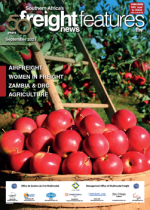Forecasts suggest that South Africa's agricultural export earnings are poised to experience a slight deceleration this year compared to the record $12.8 billion in 2022.According to Wandile Sihlobo, chief economist at the Agricultural Business Chamber of South Africa (Agbiz), the primary drivers behind this scenario are the convergence of lower commodity prices, persistent limitations on certain livestock product exports due to the presence of foot-and-mouth disease, and the stringent regulatory framework surrounding the citrus black spot disease within the European Union."While our agricultural exports have remained relatively solid in the first few months of the year, we expect the effects of these challenges to be more evident in the second half," he told Freight News. "South Africa's agricultural exports for the first five months of this year were still robust, amounting to $5.06bn, roughly unchanged from the corresponding period in 2022."The export destinations remained relatively the same as in previous years, with the African continent leading the way, followed by the EU and selected Asian and Middle-East markets. Sihlobo said the US remained a prominent export market. "With the citrus industry and nuts benefiting from the Africa Growth and Opportunity Act (Agoa) in the US market, its continuation is vital for these industries."He said citrus, maize, apples and pears, soybeans, wine, wool, sugar, f lour meals, fruit juices, and nuts were the leading export products. According to Sihlobo, the ongoing challenges faced by citrus exporters around stringent phytosanitary regulations, however, would impact the country's total export figures. "The citrus challenges in the EU are not new. The engagements on this issue between South Africa and the EU are ongoing," he said. "Regarding foot-and-mouth, the livestock industry continues to struggle with the tail-end challenges of last year's outbreaks."Sihlobo said beyond the industry challenges, one of the biggest challenges for agriculture exports remained the effectiveness of the ports."This year is arguably better than last year regarding delays the agricultural sector faces. The ongoing engagements between Transnet and the industry help ensure effective communication and that glitches in logistics are resolved quickly. Still, more work is needed to improve the logistics and, by extension, lower the cost of exporting. There is no alternative for South Africa's agriculture, as the sector is export-oriented, and therefore efficient logistics is necessary for the sustainability of farming businesses."While the country would remain a net exporter and expectations were high for a good agricultural season, the decline in commodity prices by around 11% from a year ago would take a toll, said Sihlobo. "Moreover, the biosecurity challenges and ongoing constraints in key fruit export markets such as the EU remain a constant worry."

